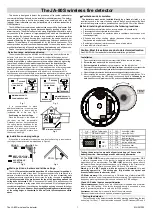
3) Type Approval Standards
The sounder carries an EC Type Examination Certificate and
IECEx Certificate of Conformity, and have been certified to
comply with the following standards:
EN60079-0:2012+A11:2013 / IEC60079-0:2011 (Ed 6):
Explosive Atmospheres - Equipment. General requirements
EN60079-1:2007 / IEC60079-1:2007 (Ed 6):
Explosive Atmospheres - Equipment protection by flameproof
enclosures "d"
EN 60079-31:2014 / IEC60079-31:2013 (Ed 2):
Explosive Atmospheres - Equipment dust ignition protection
by enclosure "t"
4) Installation
Requirements
The sounder must only be installed by suitably qualified
personnel in accordance with the latest issues of the relevant
standards:
EN60079-14 / IEC60079-14: Explosive atmospheres -
Electrical installations design, selection and erection
EN60079-10-1 / IEC60079-10-1: Explosive atmospheres -
Classification of areas. Explosive gas atmospheres
EN60079-10-2 / IEC60079-10-2: Explosive atmospheres –
Classification of areas. Explosive dust atmospheres
The installation of the sounder must also be in accordance
with any local codes that may apply and should only be
carried out by a competent electrical engineer who has the
necessary training.
5) Special Conditions of Use
Repair of the flamepath / flameproof joints is not permitted.
The enclosure is non-conducting and may generate an
ignition-capable level of electrostatic charges under certain
extreme conditions (such as high-pressure steam). The user
should ensure that the equipment is not installed in a location
where it may be subjected to external conditions that might
cause a build-up of electrostatic charges on non-conducting
surfaces.
Additionally, cleaning of the equipment should be done only
with a damp cloth
.
6) Location and Mounting
The location of the sounder should be made with due regard
to the area over which the warning signal must be visible.
They should only be fixed to services that can carry the
weight of the unit.
The BEx sounder should be secured to any flat surface using
the three 7mm fixing holes on the stainless steel U shaped
mounting bracket. See Figure 1. The required angle can be
achieved by loosening the two large bracket screws in the
side of the unit, which allow adjustment of the sounder in
steps of 18°. On completion of the installation then two large
bracket adjustment screws on the side of the unit must be
fully tightened to ensure that the unit cannot move in service.
Fig. 1 Fixing Location for Sounder Flare
Fig. 1 Fixing Location for Sounder Radial
7) Access to the Flameproof Enclosure
To access the Ex d chamber, remove the four M6 hexagon
socket head screws and withdraw the flameproof cover taking
extreme care not to damage the flameproof joints in the
process. M6 cover screws are Class A4-80 stainless steel
and only screws of this category can be used for the
enclosure.
Fig. 2 Accessing the Explosion proof Enclosure.
On completion of the installation, the flameproof joints should
be inspected to ensure that they are clean and that they have
not been damaged during installation.
Check that the earth bonding wire between the two castings
is secure and the ‘O’ ring seal is in place. When replacing the
flameproof cover casting ensure that it is square with the
flameproof chamber casting before inserting. Carefully push
the cover in place allowing time for the air to be expelled.
Only after the cover is fully in place should the four M6
Stainless Steel A4-80 cover bolts and their spring washer be
inserted and tightened down. If the cover jams while it is
being inserted, carefully remove it and try again. Never use
the cover bolts to force the cover into position.
Warning – Hot surfaces. External surfaces
and internal components may be hot after
operation, take care when handling the
equipment.
Warning – High voltage may be present,
risk of electric shock. DO NOT open when
energised, disconnect power before
opening.
(Appropriate cable glands
to be customer supplied)
Flameproof cover
M6 Cover
Screws
M6 Spring
Washer


























